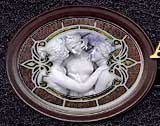|
Literary Commentary: A Pause from Poesy
I began wading through Sir Philip Sidney's Apology for Poesy, trying to absorb his
reasoning against the accusations that it produces lies, serves no good purpose, promotes
immorality and nearly emasculates mankind. Becoming interested in what might have goaded him to
write it, I stopped to look at Stephen Gosson's Schoole of Abuse, and found it amusing
enough to comment on it despite its being outside the scope of my reading material at the time.
Gosson himself had written plays, but in this work looks upon them as a past sin, actually
claiming greater credibility because he speaks from experience. He claims the School is a small
thing, but hopes that, like small clouds that carry rains and blunt stones that sharpen blades,
it will have its impact. Which, I suppose from a religious point of view, is valid; no one rails
against sin more than a former sinner.
I think it an irony that Gosson's puritanical caution is itself full of poetry, or at least what
I consider poetic, expressive language. As the piece seems more for grabbing attention and
generating controversy than for posing as a formal work, it overflows with metaphors and colorful
historical references to make his point; the language is made attractive to more easily be
absorbed and enjoyed. However, at the same time he derides poetry for its sweetness, in the same
way that a "deceitfull Phisition giueth sweete Syrropes to make his poyson goe downe the smoother"
and "Harpies haue Virgins faces, and vultures Talentes" (Gosson, par. 29) He goes on to suggest
that poetry is fair outside but hides ill, as the Trojan horse hid soldiers or a decorated
sarcophagus hides a corpse.
He compares the richness of the poets' work of his time with touching a sore; it serves no purpose
and probably makes it worse. While needless poetry seems a small and pleasurable thing, he deems
it dangerous; a cook can affect only the tongue and stomach, a painter only the eye, but the poet's
work enters the heart and mind. The Devil takes joy in making these small abuses into great ills.
To Gosson, it would be better to remember that real poetry is meant to describe the exploits and
lives of the noble and to deliver good counsel, not to engage in loving admiration. He goes so
far as to claim that the worthy physical activities of the past - shooting, running, wrestling, and
strength of arms - has been corrupted by Englishmen to "wallowyng in Ladies laps, our courage to
cowardice, our running to ryot, our Bowes into Bolles, and our Dartes to Dishes," and that the
England of his time was plagued with numberless poets who lived by begging from others
(Gosson, par. 64).
Obviously, Sir Philip didn't care for the Schoole of Abuse, nor its dedication to him. If
Gosson suggests that the richness of poetic description sours the flavor of reality, Sir Philip
responds that a poet's ability to create new worlds surpasses the mere reporting of the historian,
who must work solely with observed events. Poetry is not the liar Gosson supposes, because the
poet with his invented metaphors affirms nothing, therefore lies about nothing.
With this extra tidbit of insight at my disposal, I then returned to Sir Philip's heartfelt
defense.
For Reference:
Sir Phillip Sidney's The Defence of Poesy
Stephen Gosson's The Schoole of Abuse
Works Cited:
Gosson, Stephen. The Schoole of Abuse. Arber Edition, 1895. Transcribed by Richard Bear.
July 2000. University of Oregon. http://darkwing.uoregon.edu/~rbear/gosson1.html
David Elsensohn, March 2005
Return to Essays
|

